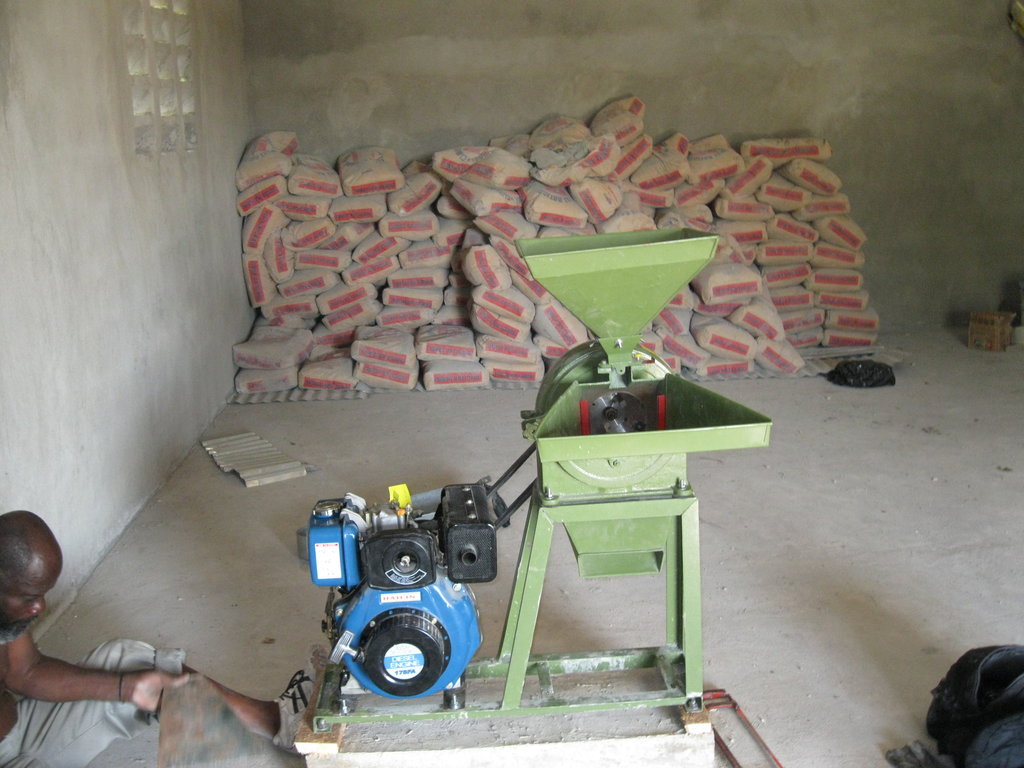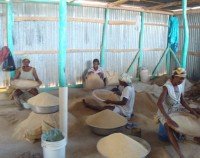By Marie Marthe Saint Cyr | Executive Director
SUSTAINABILITY
When OBS partnered with the Lambi Fund of Haiti over 10 years ago to build a grain mill which would be run and operated by the organization member Jean V. It was one of the first project addressing alimentation and improved working conditions for farmers. Often they had to walk for half a day to grind their grain, transform into cereal for the market. Their sole revenue would take the whole family to assure the harvest. Children left school to carry grains to the mill. far away. One woman, Marie Denise said she would have to wake in the middle of the night to make it to the mill. Once the lines were so long she had to return home without grinding for the market.
Jean V. had to travel south to Kanperin to learn how to operate the new machine, vastly different than the hand grinder they were using then. Jean lives in the Artibonite, a region in North West Haiti and had agreed to go to the only training center in Kanperin in the South. This training was not the only one. As the Lambi Fund team assessed and evaluated the workshops’ impact, it became evident that the teams trained to operate and maintain the mills needed to receive training. In addition , the organization needed a wider range of skill sets, including marketing, pricing and customer service.Today we are partnering with AJSDC in the Latibonite region adjacent to Gros Morne, the home of OBS. It would take members of AJSDC over 10 hours to get to Kanperin to obtain training. Today it is the experienced OBS mechanics that have trained the new mechanics for AJSDC. OBS serves as trainers, a model for hands on learning, model of what can be accomplished. The experienced mechanics assure the overall functioning of the mill, troubleshooting when in need of repair. OBS today accounts for three Milling machines, with capacity to pick up and deliver the grainss transformed to millet, corn meal and rice.
All participants, including the facilitators benefit from the experience. The members responsible for training other partner organizations face the occasional challenge to adapt their curriculum to the specific needs of a new community. Their experience as peer educators also strengthens their understanding of the realities in which they live, the commonality of some issues and the singularity of others. The process transforms them into experts in the subject matter and in understanding and addressing the productive capacity and challenges of partner organizations. This peer exchange model also reinforces the point that sustainability also means continuous learning and skills building
The mills no longer sit idle as had been the case in the past, when the motor breaks down, or if they need a spare part, they are able to fix the problem rapidly thanks to the support of their partner organization which is located in the area and which has most probably addressed and resolved these problems. This makes it possible for the mills to operate more frequently and more efficiently making it possible for the organizations to offer better service with greater profitability.
The essential idea is that peer educators and learners share some degree of common experience and desire to help and learn from one another.[1] Peer education programs enable people to gain the knowledge and skills to strengthen their communities, advocate for themselves and their needs and assert more control over their lives.Since the peer to peer training has worked very well with mill operations, the Lambi Fund has realized cost savings in estabishing the many mills that rural farmers are developing and will continue to build as rural farmers increase their productivity in the field.
Links:
By Sarah Leavitt | Digital Outreach Manager
By Sarah Leavitt | Outreach Manager
Project reports on GlobalGiving are posted directly to globalgiving.org by Project Leaders as they are completed, generally every 3-4 months. To protect the integrity of these documents, GlobalGiving does not alter them; therefore you may find some language or formatting issues.
If you donate to this project or have donated to this project, you can receive an email when this project posts a report. You can also subscribe for reports without donating.

